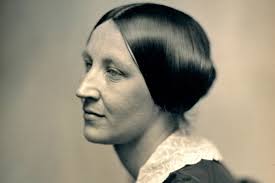 2019 is 1919 All Over again:
2019 is 1919 All Over again:
Why I Wrote
UNCOMMON FAITH
Perhaps it’s significant that UNCOMMON FAITH is being reissued in 2019.
After all, one hundred years ago – after decades of struggle – women finally achieved the right to vote. And I wish my characters like Faith Common and Amanda Putnam and Celia Tanner had been around to see it. Unfortunately, they were living in 1837.
Despite the achievement of that hard-earned right, as I was growing up, I keenly felt my disadvantages as a girl. In the 1960s, my teenage years, the only high school sport I could participate in was cheerleading; the only job prospects I saw on my horizon were as secretary, nurse, or teacher. Even the achievement of going to college did not necessarily mean entry into a profession like law or medicine or engineering: it meant earning a degree called “MRS.”

 Now, 100 years after the 19th amendment was passed – thank you Elizabeth Cady Stanton, Susan B. Anthony, and scores of others – things are much better for women. Title IX prohibits discrimination in education, encouraging equal participation in sports and other programs. Think: Women’s World Cup Soccer Championship. Women have entered and excelled in professions like law and engineering and medicine. Think: Ruth Bader Ginsberg, Supreme Court Justice. Women dared to reach for the highest offices in the land. Think: Hillary Clinton’s nomination for President of the United States.
Now, 100 years after the 19th amendment was passed – thank you Elizabeth Cady Stanton, Susan B. Anthony, and scores of others – things are much better for women. Title IX prohibits discrimination in education, encouraging equal participation in sports and other programs. Think: Women’s World Cup Soccer Championship. Women have entered and excelled in professions like law and engineering and medicine. Think: Ruth Bader Ginsberg, Supreme Court Justice. Women dared to reach for the highest offices in the land. Think: Hillary Clinton’s nomination for President of the United States.
And yet deep disparities remain. Although women represent over fifty percent of the population, only twenty percent of our elected officials are female. Although women’s reproductive freedom has been established by the United States Supreme Court, legislatures – made up overwhelmingly of men – are chipping away at women’s reproductive rights. Although women have entered the workplace in record numbers, they are often subjected to sexual harassment and pay inequities.
I have always been curious about my foremothers, those mothers and grandmothers who secured the vote for me. But I was equally curious about my great-grandmothers and great-great-grandmothers who were often subjected to crushing limitations. Some of what they endured and fought to overcome are described in the pages of UNCOMMON FAITH. Think: Sarah Grimke, Angelina Grimke, and Mary Lyon. In 1837, however, other trailblazing women were working hard to improve conditions for women. Think: the mental health efforts of Dorothea Dix; the equal rights movement of Susan B. Anthony and Elizabeth Cady Stanton; the anti-slavery work of the Grimke sisters; the protest against taxation without representation by Harriot Hunt. There are scores of others.
UNCOMMON FAITH, like all of my books, raises questions. At the heart of the story are questions like this: In what ways do limited educational opportunities restrict a person’s life? In what way do restrictive gender roles prohibit growth and development? In what ways do cultural stereotypes promote restrictions on a person’s freedom to thrive and flourish, to develop their own unique capacities?
Read UNCOMMON FAITH to consider your own answers to these questions. As outspoken Amanda Putnam says in UNCOMMON FAITH, “Once you recognize a wrong, you commit another wrong by not attempting to right it.” I’m hoping that this novel will inspire you, for there is much yet to do. Think: How will you choose to right the wrongs you see in the world?

